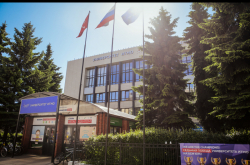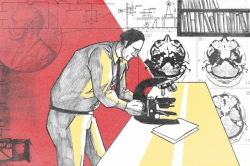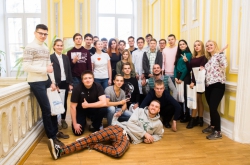The opportunities for Russia’s scientific-technological development depend on not only scientific but also entrepreneurial potential of researchers. It is with this goal in sight that the speakers of the ‘Technological Entrepreneurship’ section of the ‘Small Business as a National Project’ forum stated that the country needs a new generation of young specialists that can make use of their technological and entrepreneurial skills to develop independent business projects and commercialize their research results.
The participants of the forum believe that balance and effective system of interaction between scientists, engineers and entrepreneurs are essential to bring about successful commercialization of scientific developments through the coordination of activities and communication between the state, universities, and business.
“It is most unfortunate that the phenomenon of technological entrepreneurship has only just started to take the center stage in Russia, and that it hadn’t been taught in schools and universities in a comprehensive way. What has become clear now is that in addition to its extensive resources, our country can also boast a wealth of technological inventions. In this respect, it is innovation companies which create breakthrough technologies for external markets that can bring in the largest profits,” says Sergey Borisov, Chairman of the Board of Trustees of OPORA RUSSIA.

Entrepreneurship in schools as a key current trend
Nina Kuznetsova, Head of the ‘Junior Achievement’ nonprofit organization, highlighted the importance of teachers fostering entrepreneurial culture in school students. This was also addressed by the governor of the Ulyanovsk Oblast Sergey Morozov, who announced that starting from September 1, 2019, all schools in the region will introduce a compulsory subject on entrepreneurship.
“As of now, we have already made arrangements with leading universities for creating specialized departments of entrepreneurial development. I propose that the experience we’ve gained in our region be used as a foundation for a similar nationwide program in the future. We estimate that by 2022, 100% of school students will be receiving entrepreneurial training,” says Sergey Morozov.
According to the governor, what makes the educational program about to be introduced in the region special is its practice-orientedness. Students will participate in regular meetings with entrepreneurs and visits to companies, while teachers will receive additional training in providing instruction in the fundamentals of business. This measure won’t make every student an entrepreneur, but these classes will give them the opportunity to increase their financial literacy, as well as form an understanding of how to run a business and manage their money, believe the forum participants.

“In addition to management leaders, we have to train technological leaders. There is an acute lack of managers able to promote technologies and evaluate the market. What this will impact the most is the quality of business in the country, as nowadays trade enterprises account for the majority of Russia’s small-business sector,” notes Sergey Borisov. “Many countries are now starting to talk about entrepreneurship, as well as teaching it as early as in school. The younger generation know what they need, and we need to develop our own system of working with the youth but not do this by forcing or pressuring them. We need to establish a comprehensive system of managing these processes, whilst also recognizing best practices and implementing them all over the country.”
Technological entrepreneurship in universities
One way that student business projects are supported in the Moscow Institute of Physics and Technology is providing them with funding from the university’s endowment, shared Viktor Stepanov, business tracker of startup accelerator ‘Start.MIPT’. The fund itself exists on donations given out by MIPT alumni. Apart from making a financial contribution, the graduates can take on the role of project mentor or, like the famous Russian business angel and ABBYY founder David Yang, host lectures and participate in meet-ups with the university students.
The Bauman Moscow State Technical University searches for new forms of developing entrepreneurship within the university walls. It is within this framework that the university launched the technological entrepreneurship school ‘SchoolTech’, of which ITMO University is a partner.
“We try to provide students with the skills that are often overlooked in schools, colleges and universities,” explains Anna Danilina, SchoolTech’s Executive Vice-President. “Our global mission is to link hi-tech industries and business community with educational institutions. In this, we are helped by our founders and university partners.”

According to Anna Danilina, what makes SchoolTech stand out is its unique methodology of working with hi-tech cases submitted by small and medium business companies, as well as its strategy of coaching the teaching staff on how to interact with enterprises and perfect their teaching approach, factoring in the best international practices.
“Success is with the countries which cultivate entrepreneurial culture in their higher education institutions. Fifty percent of lecturers in Western universities come from a business background, and these are the people that can really teach you something,” believes Sergey Borisov. “That’s why our strategy at OPORA RUSSIA is to come to universities and give students entrepreneurship classes.”
Synergy University Rector Yuri Rubin mentioned that in their university, entrepreneurship is proffered as a compulsory and comprehensive study course, not as a set of specific subjects students can pick-and-choose from. Moreover, unlike other higher education institutions, Synergy puts a premium on the studies of competitiveness in the business environment, as demonstrated by such disciplines as ‘Competition’ and ‘Competition Strategies’. Yuri Rubin himself heads the university’s Department of Competition Theory and Practice. Sergey Borisov shared that modern corporations opt for developing entrepreneurial spirit through the concept of Interprenership (internal entrepreneurship), which consists of coaching employees on competitiveness and aspects of entrepreneurial activity.
“We need to encourage competitiveness in the sense that ‘I have to be better than others’. Competition can lead to the boost in innovations as new technologies make for 50% of the total competitive advantage,” remarks OPORA RUSSIA’s Chairman of the Board of Trustees.

Head of ITMO University’s Institute of Entrepreneurship Nina Yanykina is convinced that people of all ages should have access to entrepreneurial education. This view is shared by Eduard Omarov, Vice-President of ‘OPORA RUSSIA’, who added that developing business culture in schoolchildren and students is an issue of utmost importance.
“We have to look for entrepreneurship talents as early as in preschool. For more than a year now, ITMO University has been conducting an intensive workshop for school students ‘Teens in Tech’, but this currently only focuses on high-schoolers,” says Nina Yanykina. “Starting from this September, we’ve expanded our first-year student curriculum with a cross-program module on entrepreneurial culture and psychology, which is aimed at introducing students to entrepreneurial thinking. Whatever career path they choose in the future, be it business executive, software developer, researcher, production engineer or government official, this approach will help them understand the values that condition the decisions of an entrepreneur.”
Intellectual property culture
The experts also expressed their concerns regarding the situation with intellectual property (IP) in Russia: as observed by OPORA RUSSIA’s Vice President Natalia Zolotykh, the number of patent applications drops each year. This negative trend was confirmed by Vita Vlasova, an intellectual property protection specialist at the Bauman Moscow State Technical University.
“It is not only the culture of private property that we have problems with; we experience difficulties with intellectual property as well,” reflects Nina Yanykina. “If people don’t always respect private property, then what kind of IP culture there is to expect? That’s why through offering thematic project schools and study courses to young people, we foster respect to these types of property in our society.”

Sergey Borisov upheld the fact that most Russian universities report problems with intellectual property protection, and pointed to the losses in commercialization of technologies it causes. He also broached the issue of the state investing in R&D to the neglect of the private sector when it should have been the other way round, given that the market itself expects innovations.
“We in Russia have just started introducing financial institutions of promoting technological inventions: seed investments are in their early stages, the infrastructure is being created but is far from perfect, and there is but a small demand for innovations among most companies,” observes Sergey Borisov.
The speakers concluded that there is no point in separating ‘usual’ and technological entrepreneurship because technologies are omnipresent in all spheres of our life. Business is no exception, depending on tech solutions to increase their sales. Marat Kapelyushnik, OPORA RUSSIA representative in Israel, saw in this a sign of a considerable progress Russia has made in terms of the growing concern for entrepreneurial development.

Participating in the forum was Russia’s president Vladimir Putin, who as part of his talk at the plenary session proposed to keep the moratorium on routine state inspections of small businesses for the next two years, as well as develop a law on social entrepreneurship. The head of state also identified three priority areas for forging a comfortable business environment: simplification of all procedures regulating the creation and running of business; more opportunities for small companies to bring their products into the national market; better support for small and medium-sized enterprises operating in the most significant spheres (hi-tech industries, farming and social entrepreneurship).
‘OPORA RUSSIA’ is a platform for an effective professional dialogue between owners and managers of small and medium-sized enterprises, representatives of federal executive bodies, regional authorities and municipalities, supervisory bodies, infrastructure for small and medium business support, as well as representatives of the expert community.






